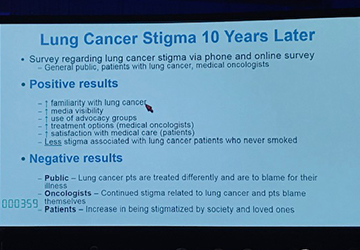
Lisa Carter-Harris, PhD, APRN, ANP-C
By Lisa Carter-Harris, PhD, APRN, ANP-C, Indiana University School of Nursing, Indianapolis, IN
This year, I joined Lung Cancer Alliance in replicating a national survey, that was first done in 2008, to examine the perspectives of patients, oncologists and the general public on lung cancer. One aspect of the lung cancer experience captured by this effort involves the role stigma plays in the lives of those touched by this disease. The results will be unveiled today in Toronto, Canada at the IASLC 19th World Conference on Lung Cancer hosted by the International Association for the Study of Lung Cancer.
While we would hope that the results would be a resounding decrease in patient reported lung cancer stigma, sadly this is not the case. In fact, the results reveal that even as public awareness about lung cancer increased over the last decade, an alarming increase in perceived stigma associated with this disease has also occurred. The reality of lung cancer stigma is tangible and has a profound impact on people living with this disease. The stigma of lung cancer is perpetuated by the public’s perception that this is a ‘smoker’s only’ disease even though we know that close to 20 percent of those diagnosed in the U.S. each year are actually people who have never smoked.
It is certainly possible that this increase in recognition of stigma is reflective of more people feeling comfortable to report it, but the fact that the trend is an upward one is still concerning. This is particularly true given that we live in an era where early detection methods are readily available to diagnose lung cancer at earlier stages when it is most treatable.

Ten years ago, we did not have an approved method to screen for lung cancer. Now that low-dose computed tomography of the chest has been an official recommendation for lung cancer screening by the United States Preventive Services Task Force (USPSTF) since 2013 and is an approved essential health benefit for most private insurers and covered through Medicare, it is concerning that lung cancer-related stigma is trending upwards. Stigma has been noted to be a barrier to both help-seeking behavior in symptomatic patients as well as individuals at high risk for the development of lung cancer.
If individuals feel stigmatized, they are less likely to engage in a conversation about screening as well as following through with an actual screening. In a previous study conducted by my team, we found that some patients would agree to be screened just to conclude the conversation with the healthcare clinician as quickly as possible fearing shame and blame from continued discussion only to cancel or not show to the scheduled screening.
We need to change the public conversation around lung cancer to one that focuses on early diagnosis, treatment and research dollars that match the magnitude of this deadly disease with immense compassion.
No one deserves lung cancer, and even more so, no one deserves to be stigmatized.
Find out more about lung cancer stigma and details on how you can cope.
Click here to learn more about your risk for lung cancer and getting a CT scan.

Leave A Comment